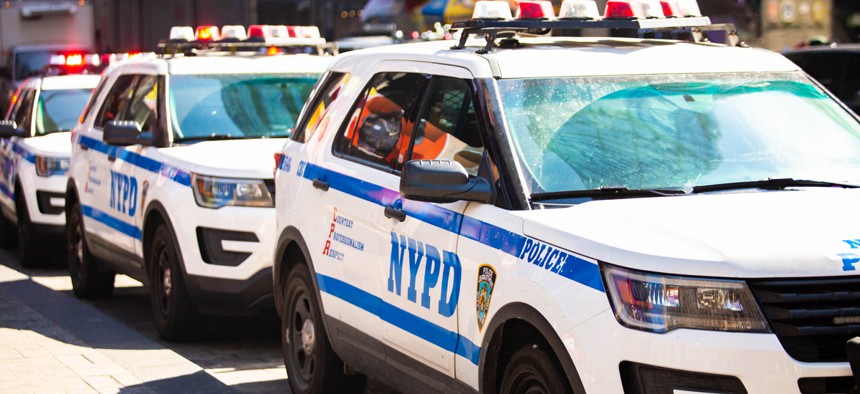New York City Tests Replacing Police with EMTs for 911 Calls about Mental Health Crises

New York City officials announced this week the start of a pilot program in two neighborhoods to respond to certain 911 calls with mental health professionals. Shutterstock
The city saw a wave of protests this summer calling for major changes in how the police operate. Now it’s the latest city to embrace the use of medical and mental health professionals for certain 911 calls.
The city with the largest police department in the country will soon test changing the way it responds to calls about people in the middle of mental health crises. New York City officials announced this week the start of a pilot program in two neighborhoods to respond to certain 911 calls with mental health professionals and emergency medical technicians.
It will be the latest in a wave of cities in recent months to debuted similar programs in response to concerns that police officers do not have the training needed to deal with people with mental illnesses. According to a report from the Treatment Advocacy Center, at least one in every four fatal encounters with police involve someone with severe mental illness.
The idea of using social workers, mental health professionals, and EMTs to respond to 911 calls about people experiencing mental health crises was gaining steam even before this summer. However, the police killing of George Floyd in Minneapolis in May, followed by months of nationwide protests calling for policing reforms, spread the concept to a wide range of cities, from Albuquerque to Los Angeles.
Though the 911 call that resulted in Floyd’s detainment was not related to mental health, the ensuing movement for police reforms focused heavily on how to prevent calls about people in crisis from escalating into violence. Calls for changes to police protocol were again renewed in New York in September, when state Attorney General Letitia James empaneled a grand jury to investigate the March death of Daniel Prude, a Black man in Rochester experiencing a mental health crisis who died after he was restrained by three police officers.
On Tuesday, New York City Mayor Bill de Blasio said that one in five residents in the city are dealing with mental health conditions. “Now, more than ever, we must do everything we can to reach those people before crisis strikes,” he said in a statement. “For the first time in our city’s history, health responders will be the default responders for a person in crisis, making sure those struggling with mental illness receive the help they need.”
The program is set to begin in February and will be rolled out in two “high-need” neighborhoods that have not yet been announced. The crisis response teams will be staffed by mental health professionals and EMTs from the Fire Department’s Emergency Medical Services unit, who will receive ongoing training and support from NYC Health and Hospitals, the public benefit corporation that runs the city’s hospitals. They’ll respond to calls for suicide attempts, substance abuse, and other complaints caused by serious mental illness.
In emergency situations where a person has a weapon or there is imminent risk of harm to other people, police officers will continue to join EMTs on the calls.
Currently, EMTs and police respond together to all mental health 911 calls, regardless of whether a crime or violence is involved. Of the 170,000 calls made to 911 about mental health concerns in 2019, the vast majority of them were nonviolent, said New York City first lady Chirlane McCray, who announced the program alongside De Blasio.
“With these mental health teams, we will test the model where we relieve police officers of those responsibilities, which in many cases, they should have never been asked to shoulder,” she said. "Treating mental health crises as mental health challenges, and not public safety ones, is the modern and most appropriate approach.”
The program in New York is modeled after the longest running alternative response to mental health challenges in the country, a program in Eugene, Oregon called Crisis Assistance Helping Out on the Streets, better known as CAHOOTS. The program has been around for more than 30 years and handles about 20% of 911 calls in the city now.
New York Police Commissioner Dermot Shea said that he is excited to see the “long awaited improvement in the city’s initial response to people in crisis,” a sentiment echoed by Fire Commissioner Daniel A. Nigro.
But the unions for both fire department paramedics and police officers expressed concerns and said they want to be included in further discussions as the program develops. Oren Barzilay, president of the fire department’s EMS union, said in a statement that they want “fair compensation for the new and extraordinary risks they are being asked to take.” The Police Benevolent Association released a statement saying the city needs “a complete overhaul of the rest of our mental health care system, so that we can help people before they are in crisis, rather than just picking up the pieces afterward.”
De Blasio said the results of the pilot will inform how the city responds to mental health emergencies going forward, especially as the city considers expanding out of the two preliminary neighborhoods.
The pilot represents “a significant step toward ensuring that New Yorkers who call 911 for themselves, a loved one, or a neighbor, will ultimately get the treatment they need,” said Ayesha Delany-Brumsey, the behavioral health director of the Council of State Governments Justice Center. “It’s exciting to see New York City boldly address a challenge faced by so many communities across the country,” she said in a statement.
Emma Coleman is the assistant editor for Route Fifty.
NEXT STORY: Georgia to Hand Recount All 4.9 Million Votes in Presidential Race






